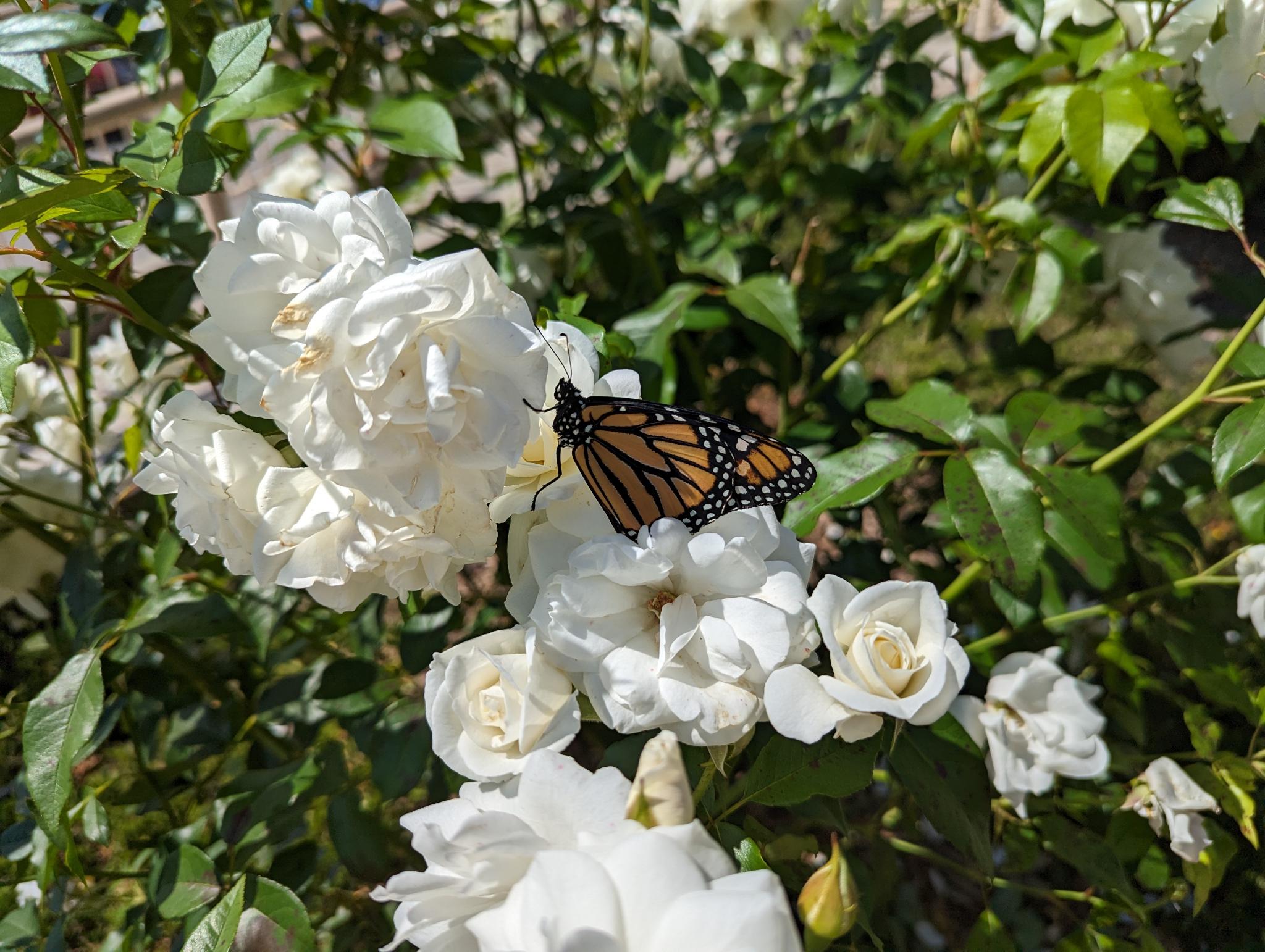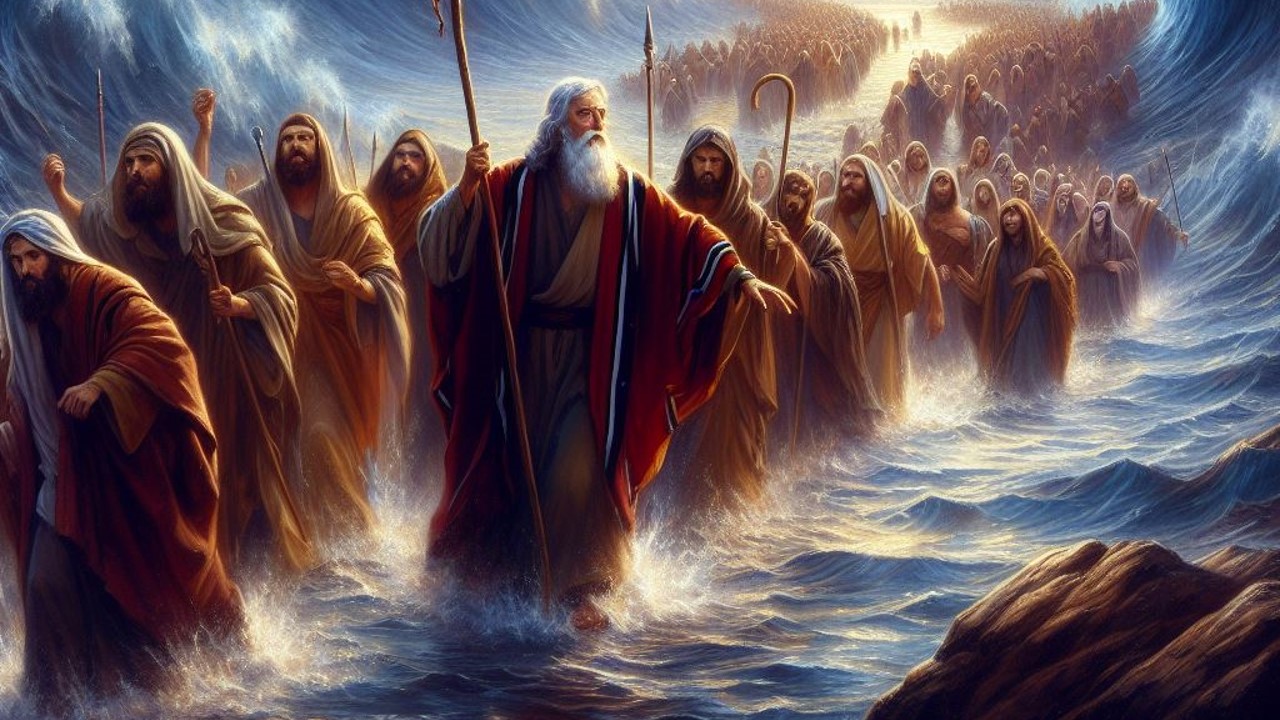把头胎分别出来 Set Apart the Firstborn
Remember these points
I put these points at the top of my sermon-prep template to remind myself every week:
- Show that main point of passage relates to Jesus and his saving work
- (1 Cor 1:18) A truly gospel-centred message will not be acceptable in a synagogue or mosque
- Did I proclaim the gospel as the headline news of the sermon, rather than as a “by the way…”?
- Unbelievers are called to repent, believe, and be saved
- Believers are encouraged to abandon their old self, renew their minds, put on the new self in Christ
- Preach simple sermons, so that God’s people can see Christ more clearly and love him more dearly
Clarification
<6>
What do these verses remind you of?
These verses are from Exo 12:40–41, which is part of the passage we studied back on 10 Dec 2023. If you read enough of the OT, particularly Genesis 5, you’d see that these verses sound like an obituary!
So and so lived so many years, then he died.
Exo 12:40–41 is like an obituary for Israel. Their old way of life is dead, YHWH is bringing them to a new life. Does this remind you of something from the NT?
In the NT, we’re often reminded that our old self is dead. In our baptism, it’s like we died with Christ. As we arise out of the water, it’s like a new birth, we’re a new person in Christ (e.g., Rom 6:1–3).
The Israelites will soon “go through the waters” and come back up. This is their new birth as a nation, one that serves God instead of Pharaoh.
Hook
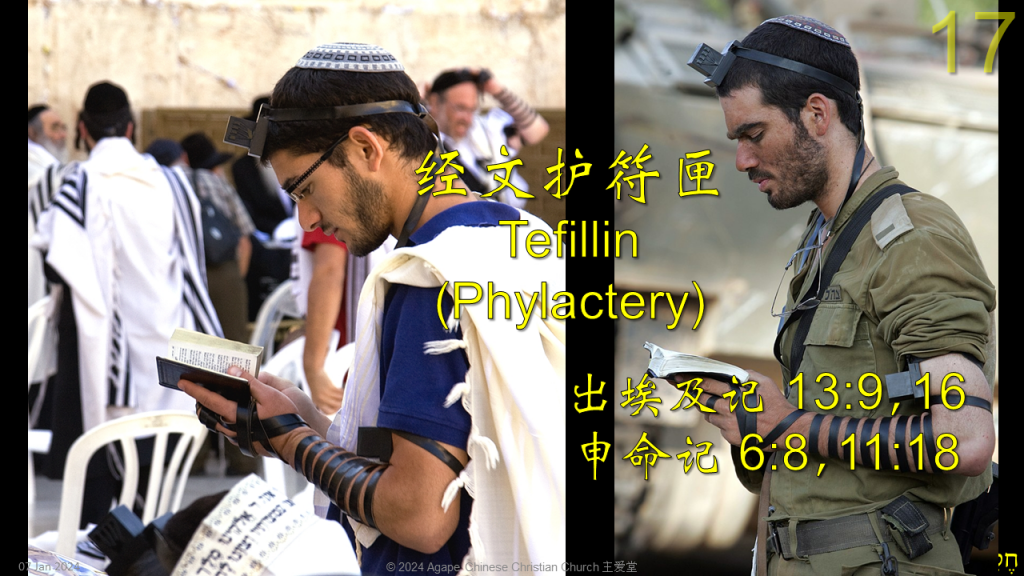
Do you know what these two guys are wearing?
Tefillin or Phylactery. Tefillin is the Hebrew transliteration, while phylactery is the usual English translation, which is actually not a very good translation. Phylactery comes from Latin (and maybe Middle English), meaning a charm or protection. This makes it sound like they wear this as some sort of superstitious charm, which is not really the case.
The wearing of Tefillin is found here: Exo 13:9, 16; Deut 6:8, 11:18.
Passage

The picture of Moses leading the Israelites during the Exodus is generated by AI, using DALL-E-3 (read about it here). Not a particularly good image, but it’ll do in a pinch.

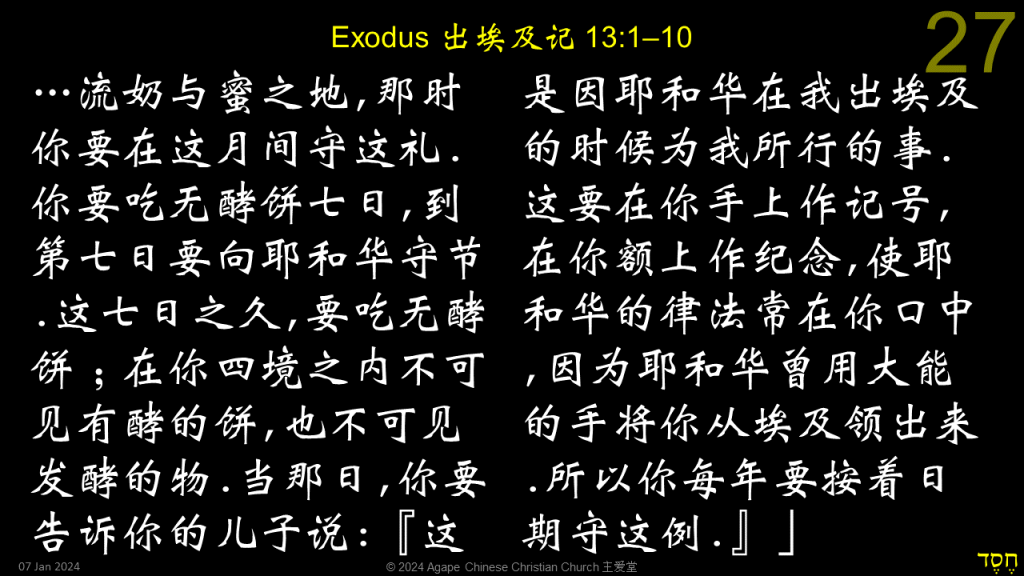
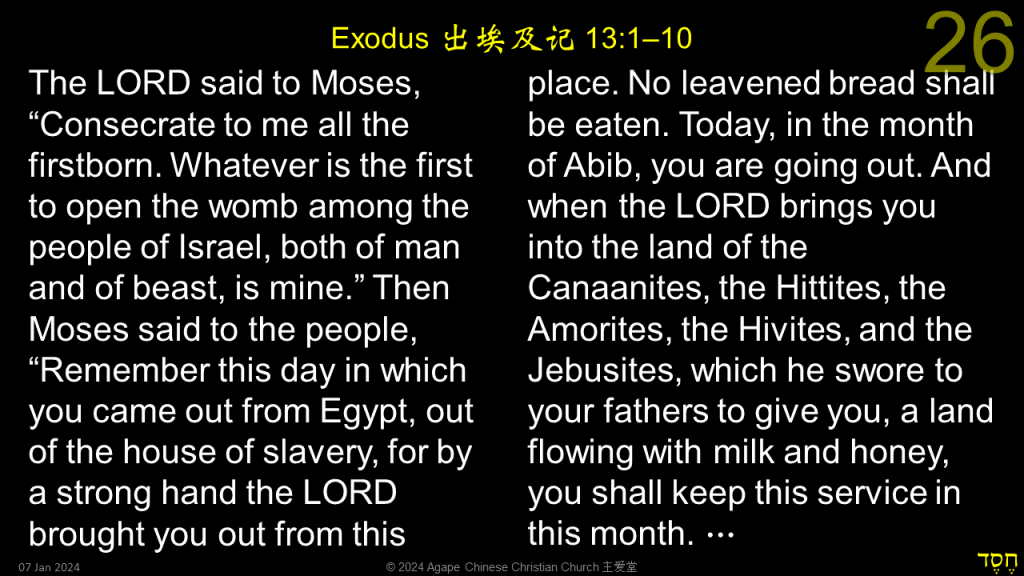

大纲 Outline

Section 1 结构 Structure
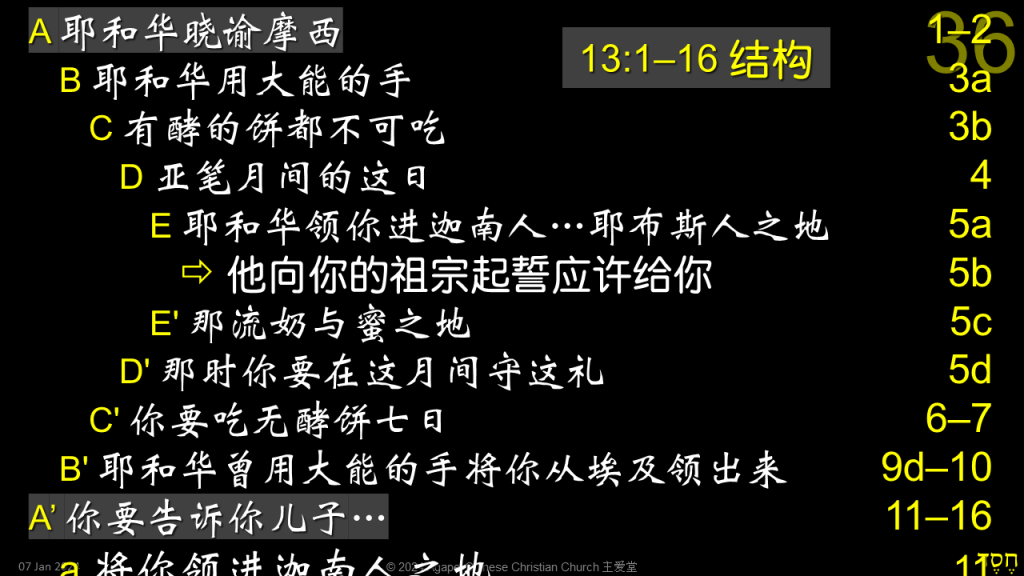

The structure of Exo 13:1–16 is unusual because there is one chiasmus embedded in another.
In the first chiasmus, 13:1–16, the final item, vv. 11–16, has the main topic of “tell your sons.” This final item is itself a chiasmus, with its centre at v. 14 “you shall say to him [your son]…”.
We will look only at 1–10 today, 11–16 will be for next week.
There are several topics, we’ll concentrate on the topics of God being faithful to his promise, and the meaning of removing yeast.
Section 2 分别为圣 Set apart

Lessons

- The firstborn represents the entire generation.
- Saving the firstborn shows that the entire family, all the offspring, belongs to God.
- Like CEO represents entire company
- Team captain represents entire team
- Christ also referred to as firstborn and firstfruits (1 Cor 15:23).

Section 3 大能的手 A mighty hand
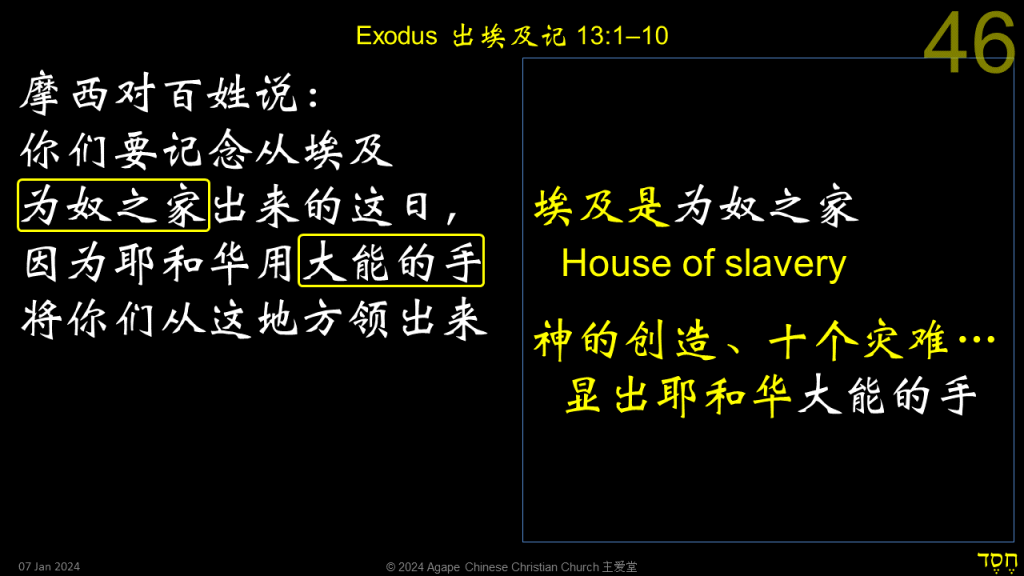
Egypt is “house of slavery.” We can contrast this with us being set free to serve God, God’s house is a house of freedom.
From Creation, the ten plagues, etc., we can see the mighty hand of YHWH.
Don’t forget that these stories are about God, telling us what he’s like.
Section 4 起誓应许给你 Swore to give you
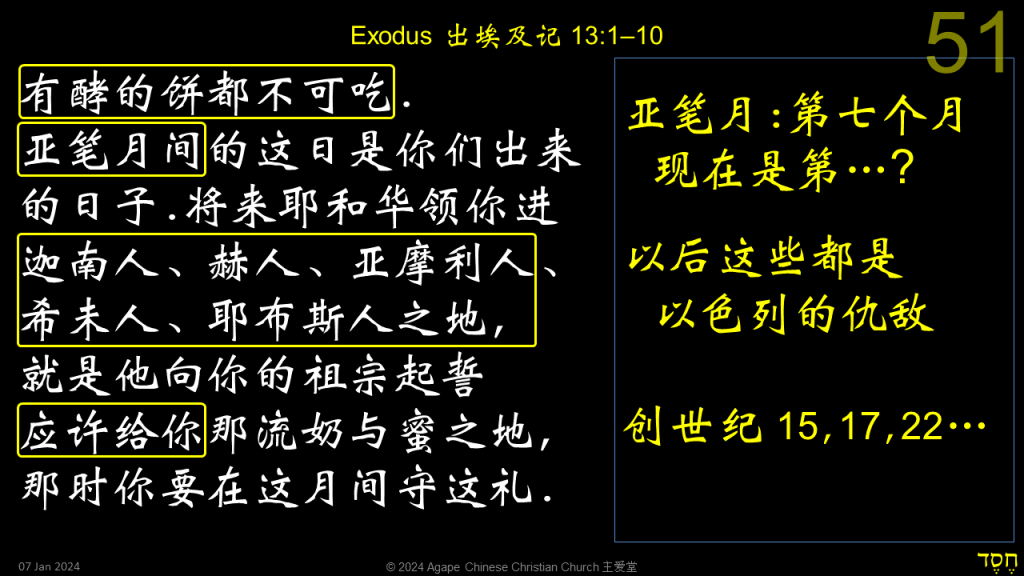
亚笔 Yà bǐ 月: Abib (month of Abib). Abib is the name of the spring month, which is actually the 7th month of the year. God changed this to be the first month (Passover).
These people groups will later become Israel’s enemies. Part of this is the Israelites own fault: they couldn’t resist the alure of worshipping the same idols as their neighbours in the Promised land.
God promised Canaan to their ancestors, specifically Abraham, Isaac, and Jacob. See Gen 15; 17; 22.
Lessons

- Can’t eat anything with yeast. Can have any yeast on you.
- This reminds us of what? Sanctification!
- The Exodus symbolises the entire process of salvation.
- Can you explain a bit how the Exodus symbolises our salvation?
Can you name some of the theology that Exodus teaches?
God’s election and sovereignty
God is sovereign, and he can basically do whatever he wants!
God chose Abel, Seth, Noah, Abraham, Isaac, Jacob, Israel, us.
Sin and punishment
We can see even from Genesis that when there’s sin, God will punish (sooner or later).
Pharaoh sinned against God (attacking God’s firstborn, the Israelites), so God punished Egypt with plagues.
Substitutionary atonement
The Passover lamb died in the place of the Israelite. The lamb is a substitute, it died so the Israelite firstborn can live.
Jesus is God’s Passover lamb. He died in our place (the substitution), so that our sins can be forgiven (atonement).
Propitiation
This word translates the Greek ἱλαστήριον (hilastērion). The general meaning is “place of satisfaction.” Propitiation is appeasing God, turning aside God’s anger.
This word appears only 2x in the NT: Rom 3:25 (translated as “propitiation” in the ESV) and Heb 9:5 (translated as “mercy seat” in the ESV). The “mercy seat” is the cover of the ark of the covenant, the place where the high priest sprinkles the blood of the lamb on the Day of of Atonement (Yom Kippur) to atone for Israel’s sins.
When the God sees the lamb’s blood on the doorframe, he will turn his wrath away (God’s wrath is appeased).
Paul is saying that God displayed Jesus as the “mercy seat,” the place where propitiation was accomplished. (NET Bible notes)
When God sees the lamb’s blood on the mercy seat, he will turn his wrath away from Israel.
When we put our faith in Christ, God will see only the blood of Jesus, which will appease his wrath.
Communion of Saints
They took the Passover together as a community.
Each family eats the Passover lamb together (just like we as a church takes Communion together as a spiritual family).
Remember this phrase in the Apostle’s Creed that we recite every month?
Another reason why it’s mandatory to be part of a church, to have communion together, to walk the spiritual path together.
All Israel takes Passover together, just like the universal church takes communion together.
Sanctification
Sanctification is the life-long process of dying to our old sinful self, and living a new life in Christ.
The Israelite are to remove all yeast from their lives.
The yeast represents their past sinful lives. They will now live their new life as servants of YHWH.
When YHWH told them to eat nothing with yeast for an entire week, it symbolises the removal of sin.
They are not to take any of their old lives with them when they leave Egypt. Just like we are to leave our old sinful self behind when we believe in Jesus.
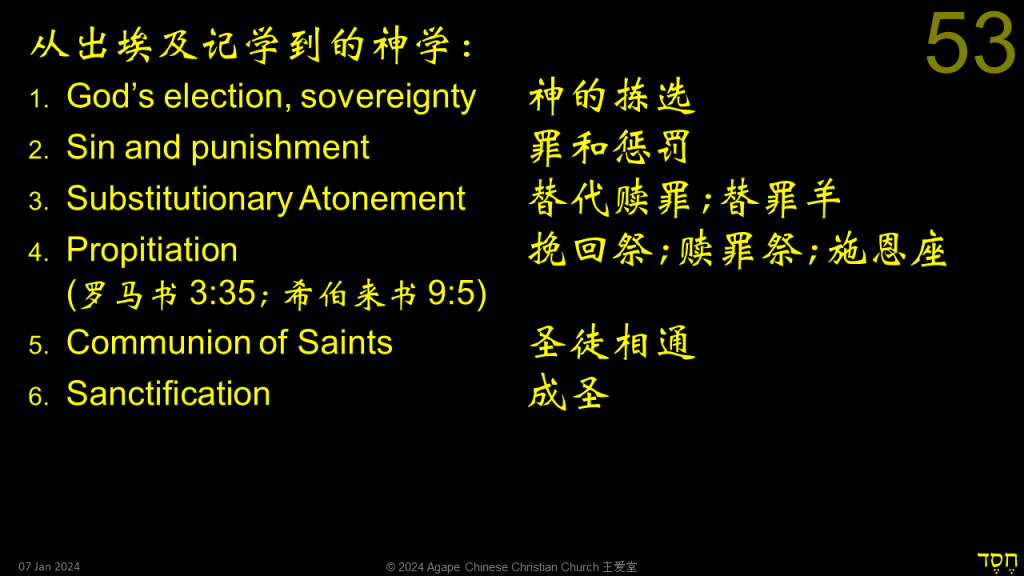
Section 5 有酵的饼都不可吃 Eat nothing with yeast
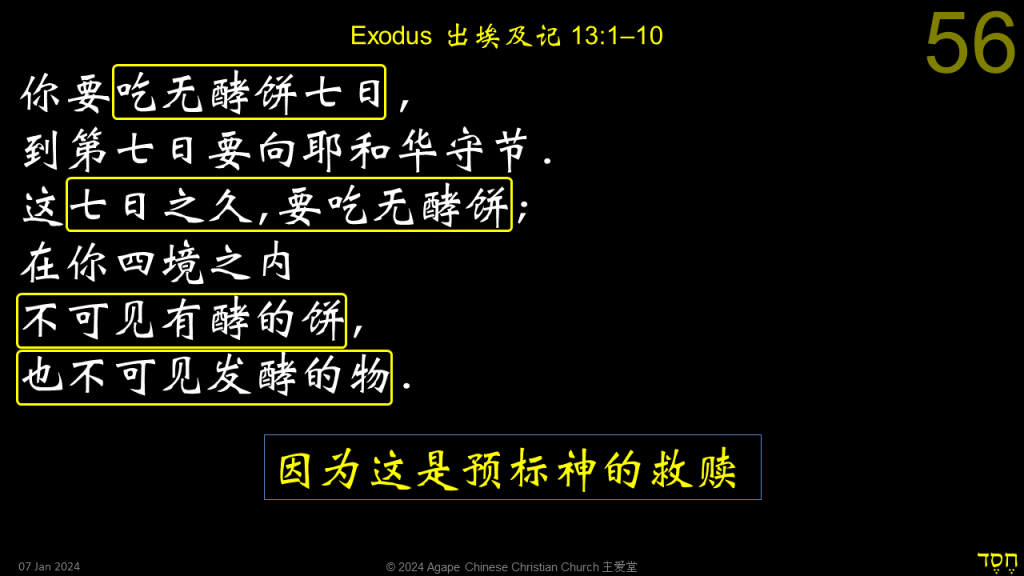
Nothing much new here. It’s basically reiterating the need to remove any yeast (leaven).
Why? Because the Exodus prefigures God’s salvation.
Section 6 作纪念 A memorial
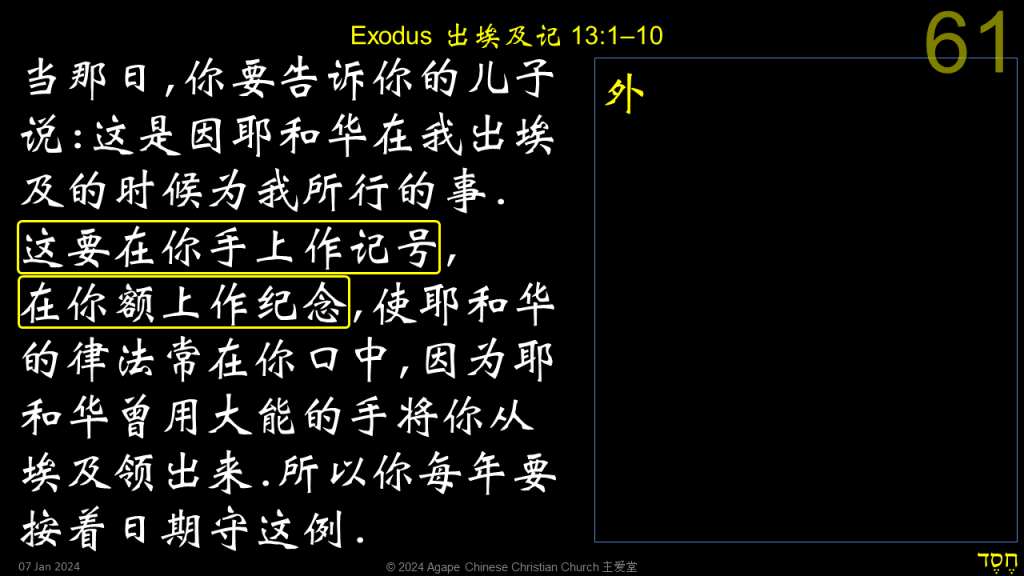
God wants them to remember their exodus from Egypt.
Similarly, God wants us to remember our salvation: Communion, when Jesus said “Do this in remembrance of me.” (1 Cor 11:23–26)
So What? 与我有什么关系?

Lessons
- These stories tell us about God. They’re not stories of how to be a good person, etc.
- We are to be “Set apart,” which means we belong to God.
We usually say “we are to be holy,” but being holy has the connotation of being perfect (as in sinless, etc.), which isn’t what being set apart means.- Everything we have belongs to God:
- Our time, money, body, talents, etc., everything.
- God’s promises will always be fulfilled
- Including his promise of our salvation (this promise started from Gen 3:15).
- Redemption is very costly. God gave his own son Jesus as the Passover lamb, so that we don’t have to die (substitution), so that God’s wrath is satisfied (propitiation).
- God wants us to remember our salvation, just like he wanted Israel to remember their salvation from Pharaoh.
